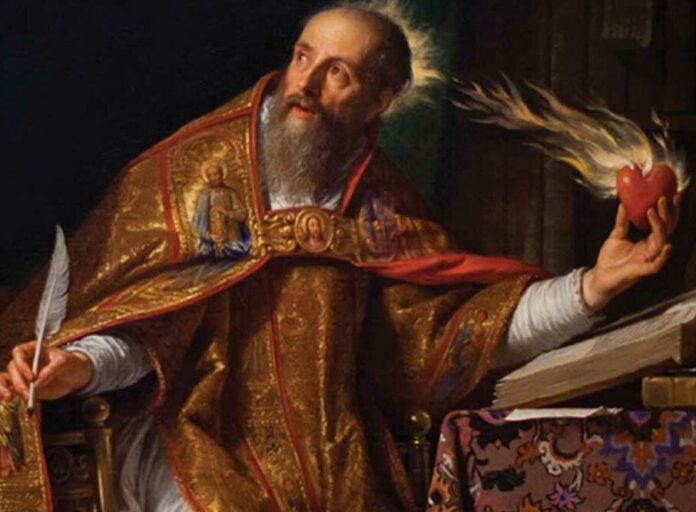From sinner to model of spiritual perfection, Saint Augustine embraced the Catholic Faith with uncommon fervour and zeal, defending it and enriching it with the extraordinary intelligence given to him by God.
Newsroom (28/08/2022 11:10 PM, Gaudium Press) Father par excellence of all the Fathers of the Church, Doctor of grace, monk, pastor, theologian, author of a monumental work and writer of genius, Augustine remains the living symbol of the converted, never ceasing to influence the spirit and imagination of Europe.
This Roman from Africa, of Berber origin, born in 354 in Tagasta, in present-day Algeria, achieved great renown for his extraordinary mastery of the liberal arts and was considered by his contemporaries to be the most illustrious of rhetoricians and the most authoritative of philosophers. An adherent of Cicero, the young Augustine went to Carthage, and then to Rome and Milan, which was then the capital of the Empire. His spiritual pilgrimages led him to adhere to Manichaeism, but it was his encounter with Christianity that was to revolutionize his existence.
At the age of thirty-two, at the insistence of his mother, St. Monica, and St. Ambrose, and after a supernatural revelation in the gardens of their home, Augustine asked to be baptized.
Tradition has it that when the ceremony of Baptism was over, St. Ambrose exclaimed: ‘Te Deum laudamus!’, and that St. Augustine added: ‘Te Dominum confittemur!’; and thus, alternating their phrases one and the other, between the two they improvised on that occasion the concepts and words that make up the liturgical chant of the ‘Te Deum’.
The tireless adversary of heresy
After a brief retreat in Cassiciaco, Augustine returned to his native land, became a monk, and devoted three years to prayer and study.
In 391, Bishop Valerius of Hippo (now Annaba) called him to himself. Augustine will succeed him in 395 in that important episcopal see. So began for this indefatigable preacher and catechist an era of great controversy – first of all, against the Donatists, who deny the Church’s pardon to the “lapsi” (apostates); then, against the Pelagians, who attribute the merit of salvation to man alone.
The Bishop of Hippo discovered in himself a vocation as a fighter against heresies, capable not only of inscribing his reflection on the problems of his time but also of building an authentic and perennial theology. At the end of his life, already in the middle of the Vandal invasion, he faced one last deviation from the Faith: those who denied the Christological dogma.
Sadness, a companion at the end of life
Around the year 430, the barbarians totally devastated North Africa. When they reached Hippo, the invaders surrounded it and imposed a rigorous siege. This event aggravated the already bitter and sad old age of St. Augustine, who suffered more than anyone else, and was fed day and night by the torrent of tears that flowed from his eyes as he saw how some fell dead and others fled, and as he considered that the churches were widowed by their priests, and the devastated populations turned into deserts.
As the horrors continued, he gathered his monks together and said to them, ‘Ask the Lord to take us out of this distressing situation, or to give us the strength to bear it, or to take me from this life and free me from witnessing so many calamities.
The Lord heard him and granted him the third of these petitions. Months after the beginning of the siege of the city, St. Augustine fell ill. Realizing that the day of his death was approaching, he had the Seven Penitential Psalms written on large posters and nailed to one of the walls of his cell, so that he could read and pray them from the bed where he lay prostrate. This was done, and the Saint, always with immense emotion of soul, constantly recited these prayers.
Shortly before his death, Saint Augustine had these interesting words: ‘No one, however virtuously he may have lived, should leave this world without first making confession of his sins and receiving the Eucharist.
Until the last moment of his life, he preserved the perfect state of his faculties, his limbs and his sight, so that, with complete mental lucidity, at the supreme moment, surrounded by his monks who assisted him with their prayers, at 77 years of age and 40 years of the episcopate, he gave his spirit to God.
Passionate searcher of the truth
A shining beacon of wisdom, a bulwark of orthodoxy, an impregnable fortress of the Faith, standing out in talent and science among the other doctors of the Church, Augustine was an eminent man, as much for the examples of his virtues as for the richness of his doctrine.
The work that he left behind is immense. One hundred and thirteen treatises, among which are the “De Trinitate” and “The City of God” which inaugurate the theology of history; 218 epistles, more than 500 “Sermons,” “Dialogues,” and biblical “Commentaries,” and finally, this unique work, the “Confessions,” the first autobiography of all time.
His theology, made of experience and permanently existential, rises to pure contemplation, without ignoring psychology, historicity, and human reality. From the dazzling illumination of his youth to the end of his old age, St. Augustine never stopped meditating on God’s gift to man, which made him a passionate seeker of truth.
[1] Cf. George Daix. Dictionary of the Saints; Jacques de Voragine. The Golden Legend.
Compiled by Zephania Gangl

































